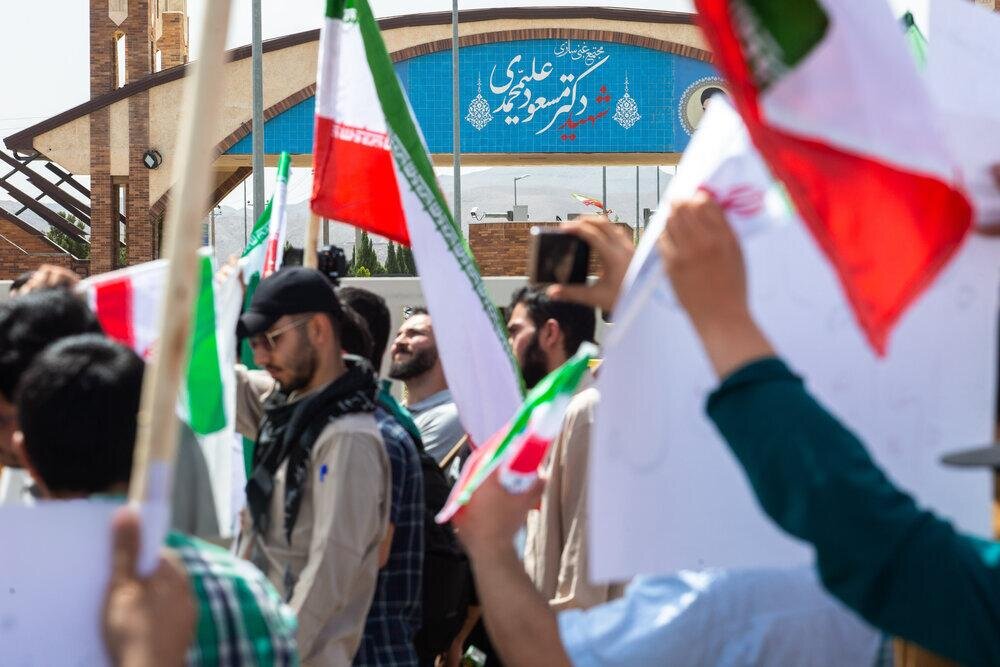Iranians have deep love for their country, which is a major reason why Iran has been around for thousands of years. Every time a country is threatened, people from all lives tend to set aside their differences and come together to protect them.
We saw it again in the 1980s when King Alexander of Macedonia knocked in 334 BC, when the Arabs invaded in 633, and when Saddam Hussein attacked.
Iranians have deep love for their country, which is a major reason why Iran has been around for thousands of years. Every time a country is threatened, people from all lives tend to set aside their differences and come together to protect them. We saw it again in the 1980s when King Alexander of Macedonia knocked in 334 BC, when the Arabs invaded in 633, and when Saddam Hussein attacked.
Foreign military may not be the biggest concern these days, but Iranians still have fierce protections of what they cherish, and for now, their peaceful nuclear program is something they cherish quite a bit.
This commitment has been fully exhibited these days. Hundreds of Iranian students were touring the country last week to meet outside the country’s nuclear facilities. They gathered at sites such as the Fordow Fuel Richment Plant near QOM, the Bushehr nuclear facility in the south, and the Nuclear Research Centre in Karaj, west of Tehran. Most recently they gathered outside the Natantz facility in Isfahan province, central Iran.
“We’re here for two reasons,” said a 20-year-old female university student, who majors in mechanical engineering. “First, to demonstrate our support for the Iranian negotiating team, and secondly, to make it clear that Iranian youth stand firmly behind our country’s rights to the nuclear program.
No protests have occurred in a vacuum. They come at a critical moment in Iran’s diplomatic struggle. Since early April, Iran and the United States have been holding indirect talks, aiming to limit Tehran’s nuclear activities in return for the termination of sanctions. From the beginning, Iran clearly states that it will not accept restrictions alone. The country intends to continue enriching uranium and will not dismantle any of its nuclear facilities. Despite Iran maintaining these positions for over 20 years and repeatedly saying they are unnegotiable, the US does not seem to want to respect these red lines. However, this behavior appears to have only strengthened public resolve.
“Uranium enrichment is not negotiable not only for this government, but for the future government,” explained a graduate student in his mid-20s. “This is something we have to maintain for future generations. We have lost so many scientists over the years due to assassinations and have suffered a lot under sanctions. We cannot simply abandon this because Trump is putting pressure on us.”
The resolve seen in Esfahan reflects the broader national atmosphere. The protesters carried signs that read, “Enrichment is right for us” and “We will stand by our country until the end.”
Analysts argue that Iran’s resilience on the issue is the reason it retains its leverage at all. North American affairs expert Amir Ali Abulfas said the US has returned to negotiations only because of Iran’s nuclear capabilities. “If you lose this leverage, everything is lost,” he said. “Even new deals can meet the same fate as JCPOA.”
This strategic order is well understood by Iranian negotiating teams, as highlighted in a recent update by Ebrahim Azitzi, chairman of the Iranian parliament’s National Security and Foreign Policy Committee. The team led by Foreign Minister Seyed Abbas Araghchi has been informed of lawmakers in detail about the progress of the meeting.
“The briefings from the Foreign Minister and negotiators demonstrate a firm commitment to protecting Iran’s national interests, maintaining the nuclear industry and promoting strategic goals,” Azitzi told Iranian media on Sunday.

